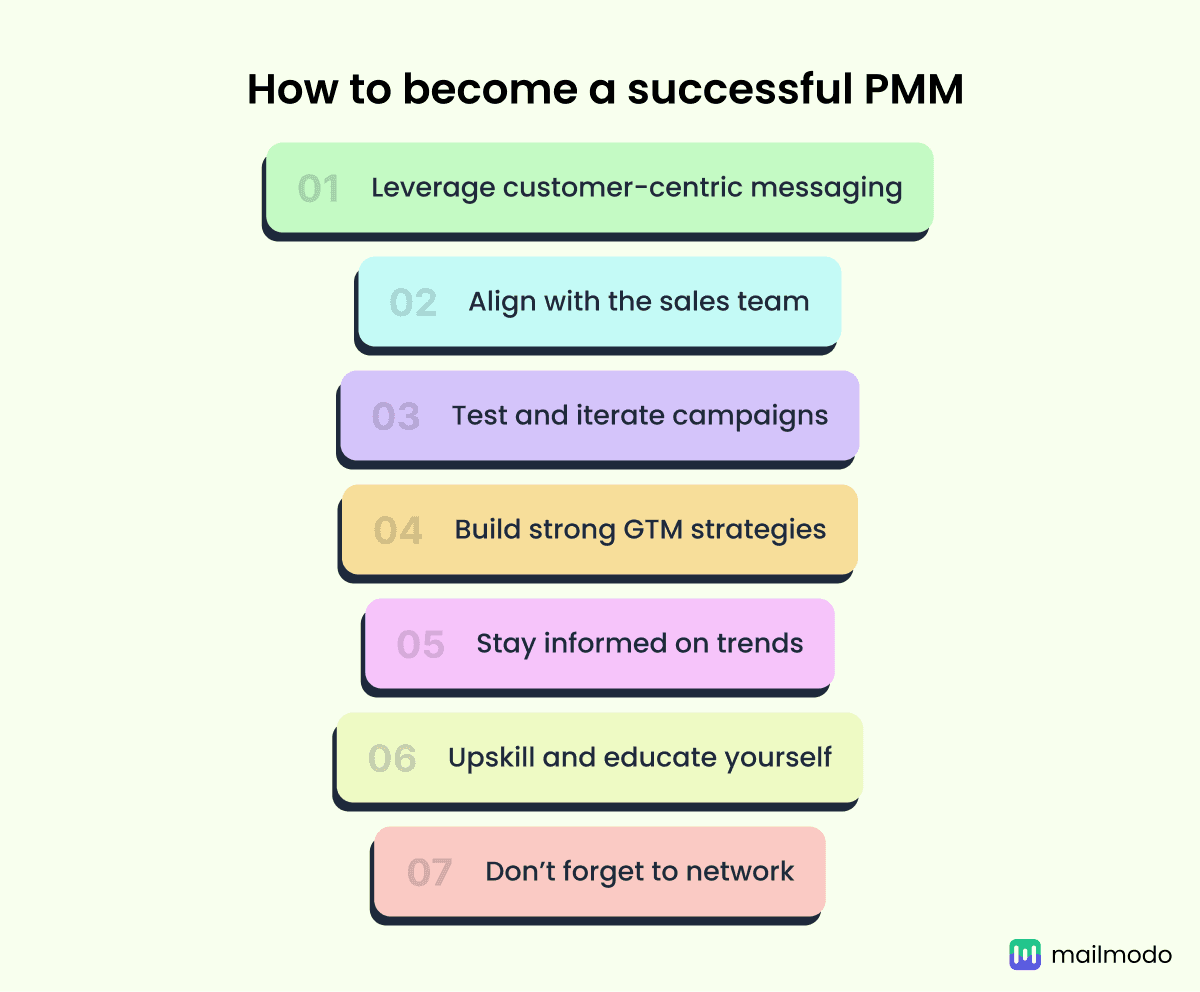Who is a product marketing manager?
A product marketing manager (PMM) is an individual responsible for positioning and creating strategies to promote a product in the market. Their job includes connecting product development and customer engagement, making sure the product appeals to its target audience.
Product marketing managers work closely with product development teams, sales teams and customer success teams to define the product's value proposition and drive product adoption.
Core responsibilities of a product marketing manager
A product marketing manager is at the core of a product’s success, shaping its positioning, driving launches, and enabling sales teams to thrive in competitive markets. From market testing to full-scale launches, PMMs develop and execute comprehensive go-to-market plans.
Let’s take a deeper look at the full responsibilities of a PMM.
Conducting market research and generating customer intel
A PMM is deeply involved in understanding the target customer. They conduct interviews, surveys and focus groups and observe customers to gain insights into behavior and preferences. They're also responsible for conducting market research to better understand the competition and identify the position of the product in the market.
Interpreting and analyzing data
Using both internal and external data, PMMs analyze trends, measure performance, and validate strategies. They gather insights from the collected data to inform decisions, ensuring that every action is backed by meaningful data for more effective product marketing.
Conducting product validation
Before committing engineering resources, PMMs validate product ideas by creating a Minimum Viable Product (MVP) or rapid prototyping. This minimizes risks by ensuring that the product addresses genuine customer needs.
Undertaking product messaging and positioning
PMMs craft narratives that define how a product fits into the market and why it matters to users. Effective product positioning ensures the product stands out, addresses specific pain points, and aligns with customer aspirations.
Undertaking sales enablement
PMMs also manage the overall process of equipping the sales teams with essential resources, including pitch decks, competitive analyses, and battlecards. Sales enablement empowers sales teams to communicate the product’s value proposition effectively, make the sales teams more efficient and increase conversions.
Ensuring customer feedback and product refinement
Post the launch of a product, PMMs collect customer feedback, analyze it, and convert it into actionable insights. These insights can then be implemented into strategies to improve products and refine messaging.
Core skills required for a product marketing manager
To excel as a product marketing manager, PMMs need to possess a unique set of skills that blend strategic thinking with tactical execution.

Here’s a closer look at the core skills that make a successful PMM:
- Strategic thinking: PMMs need to have the ability to assess market trends, predict user needs, and align product strategies with broader business goals, making campaigns purposeful and impactful.
- Strong communication skills: PMMs must be able to clearly communicate the product’s value across teams, stakeholders, and customers, ensuring consistent and effective messaging.
- Analytical and research skills: PMMs should be able to interpret data, track customer feedback, and analyze competitor strategies to refine decisions and maintain a competitive edge.
- Adaptability and agility: PMMs must remain flexible and adjust strategies quickly to adapt to dynamic markets and shifting priorities.
- Cross-functional collaboration: PMMs need to collaborate seamlessly with sales, marketing, product development, and customer success teams to execute strategies effectively.
Challenges that product marketing managers face
As a PMM, there are some day-to-day challenges that you will face while driving product success. Let’s take a look at some common challenges that you may face:
- Balancing customer needs and business goals: Aligning product features with both customer expectations and company priorities can be tricky. PMMs must find a balance that satisfies both sides—meeting customer demands while staying aligned with the company’s overall business objectives.
- Managing cross-functional teams: Coordinating between different departments, each with its own priorities and objectives, is often a key challenge for PMMs. Effective communication and collaboration are essential to ensure that everyone is aligned and working towards the same goal.
- Keeping track of market trends: Adapting quickly to market shifts and staying ahead of competitors while meeting evolving customer demands requires constant vigilance. This is particularly challenging because PMMs have multiple teams to collaborate with, and market trends can shift rapidly, making it hard to keep up and respond proactively.
- Communicating complex features: Translating complex product features into clear, digestible messaging for diverse audiences is a critical hurdle for PMMs. They need to ensure that the messaging resonates with everyone—from technical teams to non-technical customers—while maintaining clarity and simplicity.
- Having limited resources: PMMs often work with constrained budgets and tight timelines, especially in startups. This requires effective prioritization and creative problem-solving to make the most of available resources and deliver impactful results.
How to become a successful product marketing manager
Becoming a successful PMM requires a mix of skills, experience, and a customer-focused mindset. Here are some key tips to help you succeed in this role:

Leverage customer-centric messaging
A successful PMM always starts with the customer. By focusing on the customer’s perspective, you can highlight how your product solves their specific problems. It’s not just about promoting features; it’s about emphasizing the tangible benefits the customer will experience. Understanding the customer’s pain points and needs enables you to craft messaging that resonates and creates an emotional connection with your target audience.
Align with the sales team
Close collaboration with the sales team is crucial for ensuring consistent messaging and a shared understanding of the product’s value. Sales teams are on the frontlines, interacting directly with customers. By working together, you can help equip the sales team with the tools, resources, and product knowledge they need to effectively communicate the product’s value proposition, which ultimately boosts conversions and drives revenue.
Test and iterate campaigns
One of the hallmarks of a successful PMM is the ability to continuously test and refine marketing campaigns. Track metrics, gather feedback, and analyze data to understand what’s working and what’s not. This iterative process allows you to refine your strategies, tweak your messaging, and optimize campaigns to improve user engagement and conversion rates over time.
Build strong GTM strategies
A strong GTM strategy is essential for a successful product launch. This involves careful planning and coordination between product, marketing, and sales teams to ensure alignment across the all fronts. A clear GTM strategy outlines target audiences, messaging, channels, and launch timelines, ensuring everyone is on the same page and that the product launch is smooth.
-
To remain competitive, it’s crucial to stay ahead of industry trends. Subscribe to industry newsletters, follow competitors, and participate in customer interviews to gain insights into what’s happening in the market. This will help you adjust your marketing strategies, improve product offerings, and maintain your competitive edge.
Upskill with relevant courses and certifications
A strong educational foundation is key to becoming a successful PMM. Most companies require a bachelor’s degree in marketing, business, communications, or a related field. Gaining experience in marketing, sales, or product management roles helps build a solid understanding of the product lifecycle and customer journey. Additionally, pursuing certifications or online courses from reputable organizations keeps you updated on the latest trends and best practices in product marketing.
Don’t forget to network
Networking plays a vital role in advancing your PMM career. Engage with industry professionals by attending webinars and conferences and joining online communities. Networking can offer valuable insights, help you establish connections, and open doors to new career opportunities in the product marketing field.
Using Mailmodo as a PMM
As a PMM, your role goes beyond product positioning. With Mailmodo, you can implement strategies that not only boost customer engagement but also foster alignment across teams, ensuring the business grows efficiently and effectively.
Here’s how you can use Mailmodo to drive internal growth:
Increase engagement with interactive emails
Boost user engagement by using Mailmodo’s interactive email features like surveys and quizzes. These interactive elements keep your audience engaged through email marketing, while gathering actionable feedback to refine your product and messaging.
Target relevant customer segments
Mailmodo allows you to send targeted emails that resonate with specific audience segments by dynamically segmenting them based on their attributes or actions, leading to higher conversions and better alignment with business objectives.
Track and improve your campaigns
Mailmodo’s analytics dashboard helps you track your email campaign performance. Additional features also allow you to do A/B testing and analyze click maps to understand what resonates best with your audience so you can optimize campaigns.
Create and send interactive emails without coding in minutes
Takeaways
Kudos, you’ve gathered all this information about successfully pivoting or upskilling your career in product marketing. Whether you’re just starting out or looking to level up, the role of a product marketing manager offers plenty of opportunities to shape how a product is perceived and ensure it meets the needs of your audience.
In a nutshell, becoming a successful product marketing manager boils down to balancing strategy, creativity, and execution while remaining agile in a fast-moving market. As you dig deeper, you’ll realize a world of tools and platforms like Mailmodo available to help you tackle product related challenges and drive product success. So what are you waiting for? The world of product marketing awaits!












